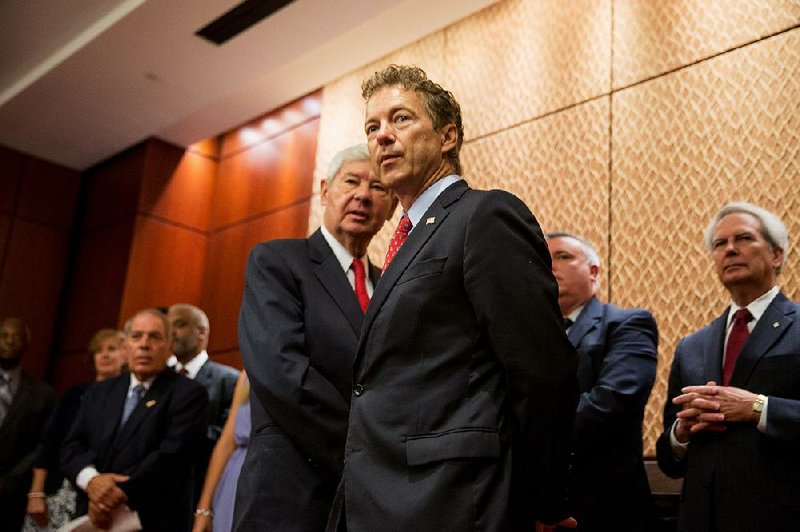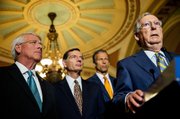WASHINGTON -- Congress approved changes Tuesday to surveillance laws enacted after the Sept. 11, 2001, terrorist attacks, eliminating the National Security Agency's bulk phone-records collection program and replacing it with a more restrictive measure that will keep the records in phone companies' hands.
Two days after Congress let the phone-records and several other anti-terror programs expire, the Senate voted 67-32 to send the revised legislation to President Barack Obama, who signed it Tuesday evening.
"This legislation will strengthen civil liberty safeguards and provide greater public confidence in these programs," Obama said in a statement.
Officials said it could take at least several days to restart the collection.
The legislation will revive most of the programs that lapsed Sunday largely because of Kentucky Sen. Rand Paul's opposition. But it will start a process of removing phone records from the government and leaving them with the phone companies, allowing the NSA to access them only on a case-by-case basis.
Sen. John Boozman, R-Ark., voted in favor of the measure, while Sen. Tom Cotton, R-Ark., voted against it.
In an unusual shifting of alliances, the legislation passed with the support of Obama and House Speaker John Boehner, R-Ohio, but over the strong opposition of Senate Majority Leader Mitch McConnell. McConnell failed to persuade the Senate to revive the just-lapsed law unchanged, and came up short in a last-ditch effort Tuesday to amend the House version of the bill. Nearly a dozen Republicans who had sided with him, ended up voting for the revised bill.
"This is a step in the wrong direction," a frustrated McConnell said on the Senate floor ahead of the Senate's final vote to approve the House legislation, dubbed the USA Freedom Act. He said the legislation "does not enhance the privacy protections of American citizens. And it surely undermines American security by taking one more tool from our war fighters at exactly the wrong time."
The legislation revises the most contentious aspect of the USAPATRIOT Act -- the once-secret bulk collection program that allows the NSA to sweep up Americans' phone records and search them for ties to international terrorists.
Over six months the NSA will lose the power to collect and store those records, but the government still will be able to obtain orders from the secretive Foreign Intelligence Surveillance Court to access data connected to specific numbers from the phone companies, which typically store that data for 18 months.
"It's extremely significant, that for the first time since 9/11, Congress is enacting legislation that would actually limit intelligence authorities rather than dramatically expanding them, which has been the trend," said Elizabeth Goitein, a national security expert at New York University Law School's Brennan Center for Justice.
The vote comes two years after former NSA contractor Edward Snowden revealed the existence of the government's phone data-collection program. Several senators called him a traitor Tuesday, but experts said the changes to the NSA's bulk collection of phone records wouldn't have happened without him.
Jameel Jaffer, the American Civil Liberties Union's deputy legal director, called the bill "a testament to the significance of the Snowden disclosures" but said it's just a start.
"The bill leaves many of the government's most intrusive and overbroad surveillance powers untouched, and it makes only very modest adjustments to disclosure and transparency requirements," he said.
Paul, who is running for the Republican nomination for president, and other privacy advocates argued that the revised bill didn't go far enough to keep the NSA from accessing Americans' phone records, including the numbers, times and durations of calls.
"Often we use fear, and we say, 'We won't be able to catch terrorists,'" Paul told the conservative radio host and author Laura Ingraham on Monday, describing the threat that he said the NSA poses to civil liberties.
"We already don't catch terrorists with collecting all the data," he continued. "So, should we put television monitors in every house to try to prevent terrorist attacks? There is a zero-sum game here that leads us down a slippery slope to where there would be no freedom left."
Before Tuesday's vote, Paul introduced separate legislation that would force 28 redacted pages of the 9/11 Commission report to be made public, a cause that has been furthered by Sens. Kirsten Gillibrand of New York and Ron Wyden of Oregon, both Democrats.
White House press secretary Josh Earnest took a swipe at Paul for his opposition to the USA Freedom Act, saying there are "members of the United States Senate who look for an opportunity to build a political advantage, to gain a political advantage, and they apparently concluded that the risk was worth it."
The bill was sold as a compromise, with Obama and Republican House leaders telling the Senate to pass it without any changes.
It will continue other post-9/11 surveillance provisions that lapsed Sunday night and that are considered more effective than the phone-data collection program. Those include the FBI's authority to gather business records in terrorism and espionage investigations, and to more easily eavesdrop on suspects who are discarding cellphones to avoid surveillance.
"This legislation is critical to keeping Americans safe from terrorism and protecting their civil liberties," Boehner said. "I applaud the Senate for renewing our nation's foreign intelligence capabilities, and I'm pleased this measure will now head to the president's desk for his signature."
The outcome capped a dramatic series of events on Capitol Hill that saw Paul oppose fellow Republicans and single-handedly force the existing law to lapse Sunday at midnight, leading to dire warnings of threats to America.
The suspense continued Tuesday as McConnell tried to get the Senate to go along with three amendments that he said would make the House bill more palatable. But House leaders warned that if those changes were sent to the House for approval, there might not be support enough to pass them. The Senate rejected McConnell's attempts.
The changes sought by McConnell included lengthening the phase-out period of the bulk-records program from six months to a year, requiring the director of national intelligence to certify that the NSA can effectively search records held by the phone companies, and making phone companies notify the government if they change their policies on how long they hold the records.
McConnell also sought to weaken the power of a new panel of outside experts created to advise the Foreign Intelligence Surveillance Court.
The final vote divided Senate Republicans, with 23 voting "yes" and 30 voting "no." Senators seeking re-election in 2016 split on the issue.
Among potential GOP presidential candidates, Sen. Ted Cruz of Texas was the only "yes" vote, while Sen. Marco Rubio of Florida joined Paul in opposing the bill. Sen. Lindsey Graham of South Carolina, who announced his candidacy for president Monday, was absent.
Independent Sen. Bernie Sanders of Vermont, who is running for president on the Democratic side, also voted no.
Denise Zheng, deputy director of the Strategic Technologies Program at the Center for Strategic & International Studies, a Washington think tank, predicted this week's congressional action and said the debate is only the beginning when it comes to national security and surveillance issues.
"I think it's going to lead to more reform," Zheng said. "There's still a lot of surveillance issues, both domestic and foreign, that still need to be addressed."
One is the so-called end-to-end encryption. Major technology companies and civil liberties groups are pressing the White House to support end-to-end encryption -- a system of communication in which only the sender and receiver can read messages -- on electronic devices.
"A lot of companies are deploying end-to-end encryption," Zheng said. "There's no prohibition on end-to-end encryption."
But FBI Director James Comey has been a critic of stronger encryption, saying it makes it more difficult to track potential terrorists and other lawbreakers.
Snowden, now in Russia, talked about Tuesday's vote via video link during an event hosted by Amnesty International. He called the legislation historic because Americans are questioning long-held assumptions that intelligence officials always act in their best interest.
"For the first time in recent history, we found that despite the claims of government, the public made the final decision, and that is a radical change we should seize on, we should value and we should push forward," he said.
Information for this article was contributed by Erica Werner, Anne Flaherty, Ken Dilanian and Jim Kuhnhenn of The Associated Press; by Sean Cockerham, William Douglas and Anita Kumar of Tribune News Service; by Jeremy W. Peters of The New York Times; and by David Weigel of Bloomberg News.
A Section on 06/03/2015


